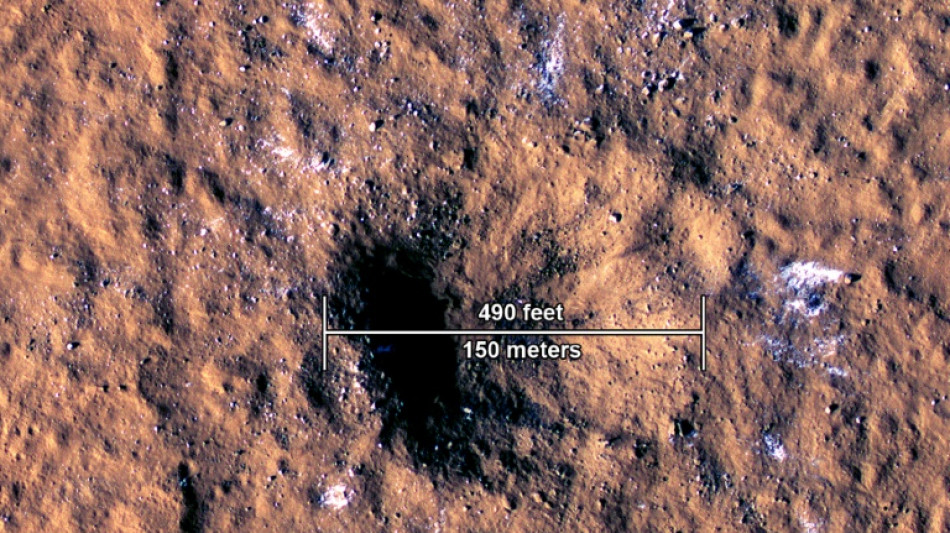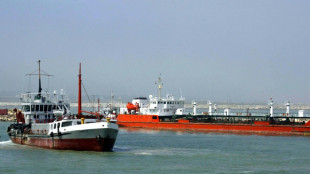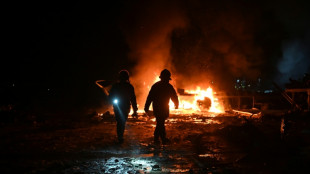
-
 Luxury retailer Saks Global files for bankruptcy
Luxury retailer Saks Global files for bankruptcy
-
Asian markets mostly up with politics bump for Tokyo

-
 Iran vows fast trials over protests after Trump threat
Iran vows fast trials over protests after Trump threat
-
China's trade surplus hit record $1.2 trillion in 2025

-
 Trail goes cold in UK abandoned babies mystery
Trail goes cold in UK abandoned babies mystery
-
Japan's Takaichi set to call February snap election: media

-
 Scientist wins 'Environment Nobel' for shedding light on hidden fungal networks
Scientist wins 'Environment Nobel' for shedding light on hidden fungal networks
-
From bricklayer to record-breaker: Brentford's Thiago eyes World Cup berth

-
 Keys overcomes serve demons to win latest Australian Open warm-up
Keys overcomes serve demons to win latest Australian Open warm-up
-
As world burns, India's Amitav Ghosh writes for the future

-
 Actor Kiefer Sutherland arrested for assaulting ride-share driver
Actor Kiefer Sutherland arrested for assaulting ride-share driver
-
Gilgeous-Alexander shines as Thunder halt Spurs losing streak

-
 West Bank Bedouin community driven out by Israeli settler violence
West Bank Bedouin community driven out by Israeli settler violence
-
Asian markets mixed, Tokyo up on election speculation

-
 US official says Venezuela freeing Americans in 'important step'
US official says Venezuela freeing Americans in 'important step'
-
2025 was third hottest year on record: EU, US experts

-
 Japan, South Korea leaders drum up viral moment with K-pop jam
Japan, South Korea leaders drum up viral moment with K-pop jam
-
LA28 organizers promise 'affordable' Olympics tickets

-
 K-pop heartthrobs BTS to kick off world tour in April
K-pop heartthrobs BTS to kick off world tour in April
-
Danish foreign minister heads to White House for high-stakes Greenland talks

-
 US allows Nvidia to send advanced AI chips to China with restrictions
US allows Nvidia to send advanced AI chips to China with restrictions
-
Sinner in way as Alcaraz targets career Grand Slam in Australia

-
 Rahm, Dechambeau, Smith snub PGA Tour offer to stay with LIV
Rahm, Dechambeau, Smith snub PGA Tour offer to stay with LIV
-
K-pop heartthrobs BTS to begin world tour from April

-
 Boeing annual orders top Airbus for first time since 2018
Boeing annual orders top Airbus for first time since 2018
-
US to take three-quarter stake in Armenia corridor

-
 Semenyo an instant hit as Man City close on League Cup final
Semenyo an instant hit as Man City close on League Cup final
-
Trump warns of 'very strong action' if Iran hangs protesters

-
 Marseille put nine past sixth-tier Bayeux in French Cup
Marseille put nine past sixth-tier Bayeux in French Cup
-
US stocks retreat from records as oil prices jump

-
 Dortmund outclass Bremen to tighten grip on second spot
Dortmund outclass Bremen to tighten grip on second spot
-
Shiffrin reasserts slalom domination ahead of Olympics with Flachau win

-
 Fear vies with sorrow at funeral for Venezuelan political prisoner
Fear vies with sorrow at funeral for Venezuelan political prisoner
-
Pittsburgh Steelers coach Tomlin resigns after 19 years: club

-
 Russell eager to face Scotland team-mates when Bath play Edinburgh
Russell eager to face Scotland team-mates when Bath play Edinburgh
-
Undav scores again as Stuttgart sink Frankfurt to go third

-
 Fuming French farmers camp out in Paris despite government pledges
Fuming French farmers camp out in Paris despite government pledges
-
Man Utd appoint Carrick as manager to end of the season

-
 Russia strikes power plant, kills four in Ukraine barrage
Russia strikes power plant, kills four in Ukraine barrage
-
France's Le Pen says had 'no sense' of any offence as appeal trial opens

-
 JPMorgan Chase reports mixed results as Dimon defends Fed chief
JPMorgan Chase reports mixed results as Dimon defends Fed chief
-
Vingegaard targets first Giro while thirsting for third Tour title

-
 US pushes forward trade enclave over Armenia
US pushes forward trade enclave over Armenia
-
Alpine release reserve driver Doohan ahead of F1 season

-
 Toulouse's Ntamack out of crunch Champions Cup match against Sale
Toulouse's Ntamack out of crunch Champions Cup match against Sale
-
US takes aim at Muslim Brotherhood in Arab world

-
 Gloucester sign Springbok World Cup-winner Kleyn
Gloucester sign Springbok World Cup-winner Kleyn
-
Trump tells Iranians 'help on its way' as crackdown toll soars

-
 Iran threatens death penalty for 'rioters' as concern grows for protester
Iran threatens death penalty for 'rioters' as concern grows for protester
-
US ends protection for Somalis amid escalating migrant crackdown


Meteorite that smashed into Mars shook planet, NASA says
Scientists who study Mars on Thursday revealed the remarkable Christmas gift they received from the planet last year.
On December 24, 2021, a meteorite hit Mars' surface, triggering magnitude 4 tremors, which were detected by NASA's InSight spacecraft -- which landed on the planet four years ago -- some 2,200 miles (3,500 kilometers) away.
The true origin of this so-called marsquake was only confirmed when the Mars Reconnaissance Orbiter (MRO) was able to take a picture of the newly formed crater created by the hit when it flew over the impact site less than 24 hours later.
The image is impressive, showing blocks of ice that were spewed up onto the planet's surface around the 492-foot (150-meter) wide and 70-foot (21-meter) deep hole.
The crater is the largest ever observed since the MRO began its Mars orbit 16 years ago.
And though meteorite impacts on Mars are not rare, "we never thought we'd see anything that big," Ingrid Daubar, who works on the InSight and MRO missions, told reporters at a press conference Thursday.
Researchers estimate that the meteorite itself would have measured between 16 to 39 feet across. An object of that size would have disintegrated in Earth's atmosphere before falling to the ground here.
"It is simply the biggest meteorite impact on the ground that we have heard since science has been done with seismographs or seismometers," said planetology professor Philippe Lognonne, who participated in two studies related to the observation published in the journal Science Thursday.
NASA released an audio recording of the collision, which was made by speeding up the vibrations collected by the seismometer.
- 'Useful' ice presence -
The valuable information gathered in studying the crash will contribute to deeper knowledge of Mars' interior and the history of how the planet was created, scientists said.
The presence of ice, in particular, is "surprising," said Daubar, who also co-authored the two studies.
"This is the warmest spot on Mars, the closest to the equator, we've ever seen water ice," she said.
In addition to the information this discovery offers about the Martian climate, the presence of water at this latitude -- and not just near the poles -- could prove "really useful" for future human visitors to Mars, director of NASA's Planetary Science Division Lori Glaze said.
"We'd want to land the astronauts as near to the equator as possible," she said, to take advantage of warmer temperatures.
"That ice could be converted into water, oxygen or hydrogen," Glaze said.
The impact was powerful enough to generate seismic waves both down to the planet's core and across its crust horizontally, making it possible to study Mars' internal structure -- revealing that the crust on which InSight sits is less dense than the crust the waves traveled over from the crater site.
The end of InSight's mission -- which recorded more than 1,300 marsquakes in total -- could come in the next couple of months, according to Bruce Banerdt of NASA's Jet Propulsion Lab, due to the expected accumulation of dust on the lander's solar power panel.
It's "sad," he said, while celebrating that the probe worked "marvelously" for four years.
B.AbuZeid--SF-PST




